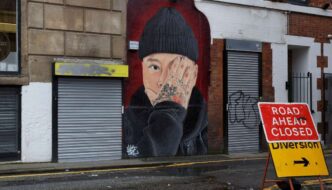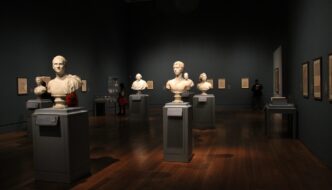
As part of this year’s Manchester Literature Festival, Olivia Laing came to the Anthony Burgess Centre to present her latest book The Lonely City. Based on her own time living in New York, it uses the city and its artists as a driving force to shine a light on the experience of loneliness in the modern world.
In the conference room, Olivia Laing answers the questions of the host with enthusiasm. Although constantly surrounded by people, inhabitants of a big city are often plagued by feelings of isolation. She comments that her book is a response to the sense of shame that often arises as a result, an attempt to describe it as sincerely as possible. In a society increasingly dictated by individualism, one feels the need to follow their own dreams; achieve their own ambitions, even at the cost of intimacy. She explains that loneliness is a state of isolation, which may lead to a feeling of alienation, even about the mere act of speaking. She confides that after a few weeks alone in New-York, she felt abnormally perturbed and shy when a barista failed to understand what she was ordering due to her accent.
Laing bolstered the content of her book with a large body of research, telling us how she progressively chose the artists which would inform her work. She especially describes the magic of having access to the museum’s archives where the belongings of the artists had been kept in boxes. This allows her to establish an incredible intimacy with each artist and tells their story with beautiful empathy. Her aim, however, was not merely to describe. As an author who has also written about alcoholism, she establishes loneliness as a societal problem, and the work of the artists she picks is similarly charged with tones of social comment and activism. Andy Warhol is no longer the glowing pop-art artist, but a man haunted by his memory of difficult integration as a migrant, passionate about words and speech and desperately trying to establish contact. The striking work of David Wojnarowicz recalls his life as a gay man frequenting the wild world of the Piers of New York, victim of the first wave of HIV. Laing also connects with the reclusive artist whose work was only discovered after his death: Henri Darger, who created a fifteen-thousand page manuscript about a war between soldiers and child-like fantasy creatures in the Realm of the Unreal.
The Lonely City presents a universally experienced state, but transforms it into a piece which is as profound as it is inspiring. The intricacy and complexity of the feeling are detailed with delightful sensitivity, enlightened by the history of the author herself and of the artists who paved the way before her.
Filed under: Written & Spoken Word
Tagged with: Anthony Burgess Foundation, art, artists, female writer, loneliness, Manchester Literature Festival, McrLitFest, MLF16, New York, Olivia Laing, The Lonely City



Comments